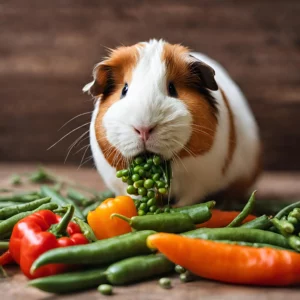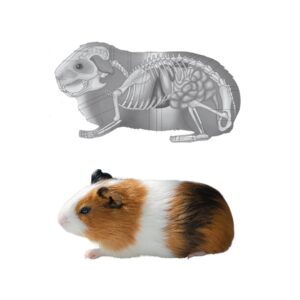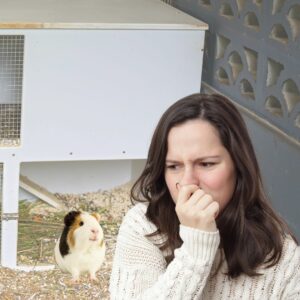It’s not uncommon for some animals to eat their feces. And as a new or potential guinea pig parent, you may wonder if guinea pigs do the same – Do guinea pigs eat their poop?
In this article, I’ll answer this question and explain what happens if they do or don’t eat their poop.
Table of Contents
The Two Types of Guinea Pig Poop
Yes, it’s true – guinea pigs eat their poop. But the ‘’poop’’ they eat isn’t the one you think it is.
Guinea pigs have a unique digestion process involving two types of feces. One is the waste in the form of dry pellets, which piggies don’t eat.
Similar to cows chewing cud, a nutrient portion of food that comes back from the stomach for re-chewing, guinea pigs have another type of feces called caecotrophs.
Caecotrophs: The Superfood for Guinea Pigs
Unlike regular poop, caecotrophs are softer and stinkier. But why do guinea pigs eat poop?
This is because guinea pigs can’t chew down the food enough to digest it immediately, so they have to repeat the process twice.
For instance, big animals such as cows can’t grind their food enough to digest it properly, so the cud goes through acid in the rumen. Then, it starts moving back to the mouth for another chewing process.
On the other hand, guinea pigs don’t have rumen. Instead, their “cud” comes out the other end for a second round of chewing. Hence, they have to eat their poop.
Keep in mind that guinea pigs can be quite sneaky; they know when it’s caecotroph time and typically handle it privately. They’ll gobble them up immediately, so it’s quite rare to notice this.
The Health Benefits of Caecotrophs
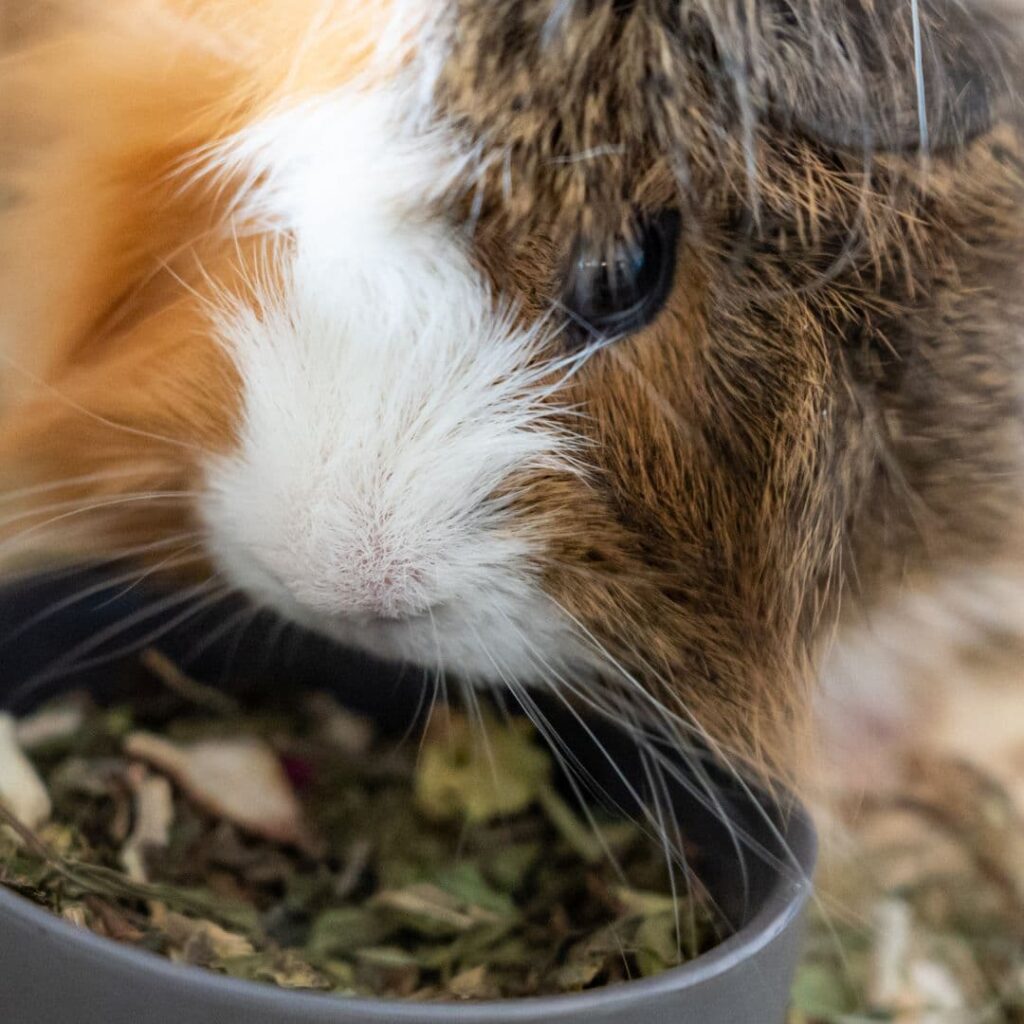
Eating their poop isn’t just a part of the proper digestion process for guinea pigs. Caecotrophs contain valuable nutrients important for your piggy’s health, which is why you may spot your guinea pig eating one.
Guinea pigs diet is quite strict and requires plenty of minerals, vitamins, and fiber. Since piggies are herbivores, their diet mostly relies on:
- fresh veggies (particularly greens) and fruit
- high-quality pellets
- timothy and orchard hay
- pure water
- sometimes grass
Caecotrophs are like a nutritional jackpot; they’re packed with must-have nutrients, especially vitamins. They also boast a lot of good bacteria that benefit a guinea pig’s gut health.
Here are some of the biggest health benefits that guinea pigs get by eating their ‘’poop’’:
- Valuable nutrients improve immunity and overall health: Mostly, the caecotrophs are rich in vitamins B and K.
- The vitamin B complex from caecotrophs plays a mandatory role in energy metabolism, nervous system function, and the formation of red blood cells. Also, the vitamin B complex boosts immune function, protecting your piggy from infections and potential illness.
- The vitamin K from caecotrophs is critical for a guinea pig’s blood to clot properly. If your piggy gets a cut or injury that causes bleeding, having enough vitamin K will help this process and prepare the body to start the recovery and heal the injury.
- Balanced gut flora: Coprophagy plays a mandatory role in maintaining a balanced gut flora in guinea pigs. Caecotrophs provide good, beneficial bacteria that improve and aid in digestion, reducing the chance of constipation or diarrhea in piggies.
- Prevention of gastrointestinal issues: With proper and healthy digestion, coprophagy prevents imbalances in gut bacteria, reducing the risk of gastrointestinal issues, such as bloating and gastrointestinal stasis (or gut stasis).
- Dental health: Chewing caecotrophs provide guinea pigs a natural dental care mechanism. The grinding action helps wear down continuously growing teeth, promoting proper dental health.
Regular consumption of caecotrophs can assist in preventing dental problems, such as overgrown or misaligned teeth.
- Weight maintenance: Caecotrophs contribute significantly to a guinea pig’s daily nutritional intake. By consistently eating these nutrient-rich pellets, piggies maintain a healthy weight, preventing issues related to malnutrition and weight loss.
What Happens If Your Guinea Pig Doesn’t Eat Their Caecotrophs?
When it comes to your guinea pig’s well-being, it’s critical to understand the importance of coprophagy. If your piggy skips these second-chance snacks, they could quickly become malnourished and sick – and we don’t want that.
Since they get a lot of nutrients from caecotrophs, the absence of this behavior could lead to potential health issues like:
- Nutrient deficiency: When guinea pig avoids eating their caecotrophs, they miss out on a nutrient-packed snack. Without these nutrients, your piggy may lack enough nutrients, leading to a range of health issues.
- Digestive problems: Avoiding coprophagy will also disrupt the bacterial balance, leading to digestion problems and negatively impacting the guinea pig’s overall health. This often causes gastrointestinal issues.
- Dental issues: Piggies who avoid consuming their caecotrophs may experience dental problems, including overgrown or misaligned teeth, causing pain and difficulty eating.
- Weight loss and malnutrition: If your piggy consistently refuses to eat these nutrient-rich pellets, it can lead to weight loss and malnutrition. A lack of vital nutrients may compromise their immune function and overall health.
- Gastrointestinal stasis: Gastrointestinal stasis, or a slowdown in the digestive system, is a serious concern for guinea pigs. When they don’t eat their healthy type of poop, the digestive process can be disrupted, leading to stasis.
- This condition can cause pain, bloating, and a decreased appetite, and if left untreated, it may result in severe health complications.
To get better insights on the importance of coprophagy, check out this short YouTube guide from a guinea pig expert:
If you notice any health issues, visit and consult your vet – don’t attempt to treat your piggies alone unless supervised by a professional.
What To Do If Your Guinea Pig Avoids Eating Their Caecotrophs?
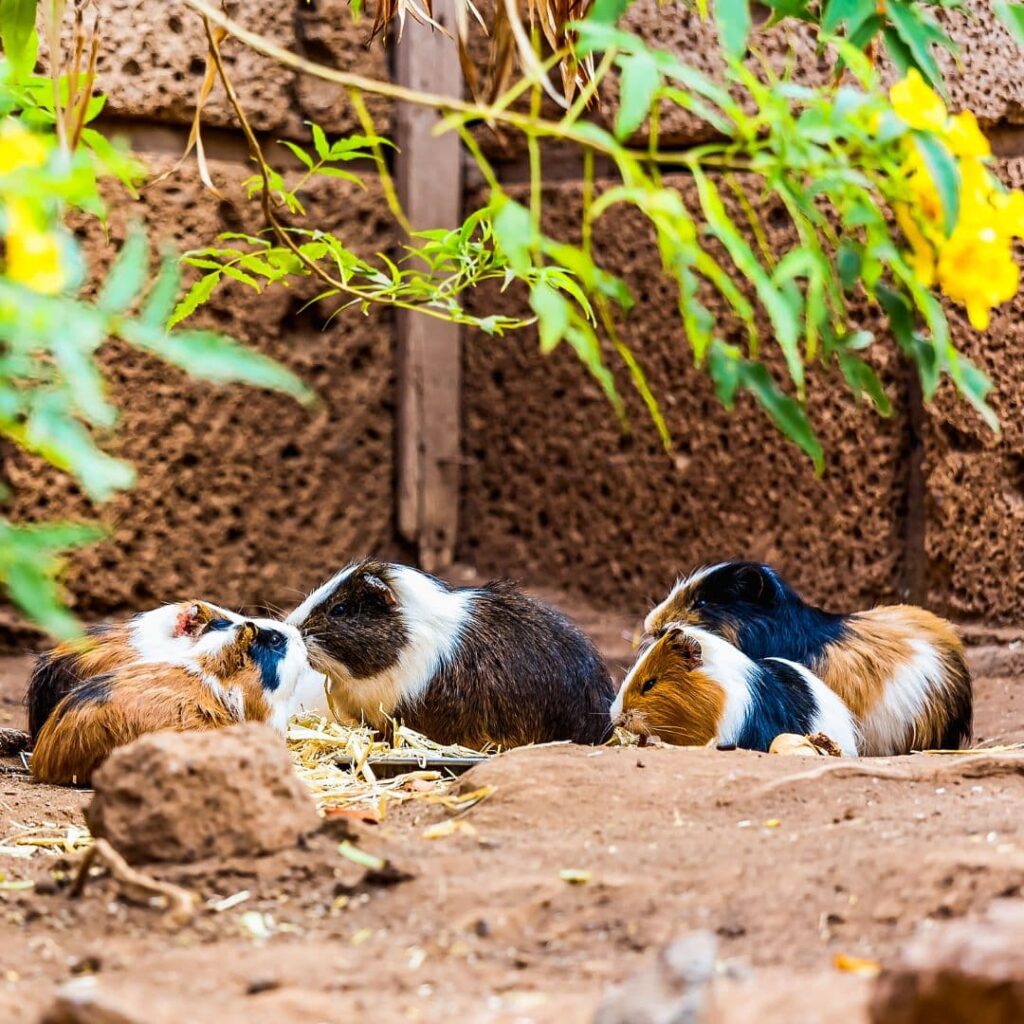
Undoubtedly, it’s clear that guinea pigs should eat their ‘’poop’’. But sometimes, guinea pigs will avoid it.
It usually happens due to an imbalanced diet, but it can also happen to senior guinea pigs due to weakened digestion. So, what to do if your piggy avoids eating it?
While the best solution is to contact your vet and get help from them, you may want to try taking the following measures:
- Diet evaluation: Take a close look at your guinea pig’s diet. This is the most common reason why piggies avoid coprophagy. Ensure they have a well-balanced mix of hay, fresh vegetables and fruit, and quality pellet food.
On the other hand, you shouldn’t feed them food that’s not fully ripe or not fresh enough. And a veriety of vitamins and minerals from different veggies and fruit is also important.
Insufficient fiber or an imbalance in nutrients can disrupt their digestive processes and reduce caecotroph consumption.
- Monitor hydration: Dehydration can adversely affect digestion. Confirm that your guinea pig has constant access to clean water, preferably provided through a water bottle with a sipper tube.
Monitoring their water intake is vital for maintaining overall health and the production and consumption of caecotrophs.
If you don’t have any water bottles yet, here are some of the quality ones to get for your piggies:
- Patented No-Drip Water Bottle/Feeder for Guinea Pigs by Choco Nose
- Weather Resistant Cage Water Bottles by Lixit
- Medium Animal Water Bottle by Mid West Homes
Pro tip: If your piggies are kept in an outdoor cage/hutch, opt for weather-resistant water bottles. This will prevent the water from freezing during chilly seasons or getting too hot during hot summer days.
- Provide a stress-free environment: Guinea pigs are sensitive creatures, and stress can impact their appetite, leading to a poor diet and health problems.
Ensure their living environment is quiet, comfortable, and free from disturbances. A stress-free atmosphere promotes a good appetite for food and caecotrophs, helping them stay healthy, and leading to a longer lifespan.
- Encourage exercise: Physical activity plays a significant role in maintaining a healthy digestive system for guinea pigs. You should provide a spacious and safe area for them to exercise and engage in their natural behaviors.
Keep in mind that regular exercise supports overall well-being and can contribute to a healthy appetite.
- Pro tip: You can also take your piggies outdoors if you have a green space and spend quality time interacting with them in the fresh air. Just be sure to be with your piggies and supervise their playtime!
- Regular vet check-ups: Routine veterinary check-ups are mandatory, even if your guinea pig appears healthy. Regular visits to the vet can help detect potential health issues early on, possibly making them avoid coprophagy, leading to a longer guinea pig lifespan.
Do Guinea Pigs Poop Where They Eat?
Now that you know your piggies eat their ‘’poop’’, you may wonder if they poop in the same place where they eat.
Well, guinea pigs eat in the same place where they doo-doo their business. But don’t worry – here are some of the effective ways to keep their living space as hygienic as possible:
- Change beddings often
- Observe and locate where your piggies typically poop, and place extra bedding of paper in that area.
- Use bowls and other similar items for food serving.
My Senior Paws is a participant in the Amazon Services LLC Associates Program, an affiliate advertising program designed to provide a means for sites to earn advertising fees by advertising and linking to Amazon.com. We also participate in other affiliate programs which compensate us for referring traffic.

